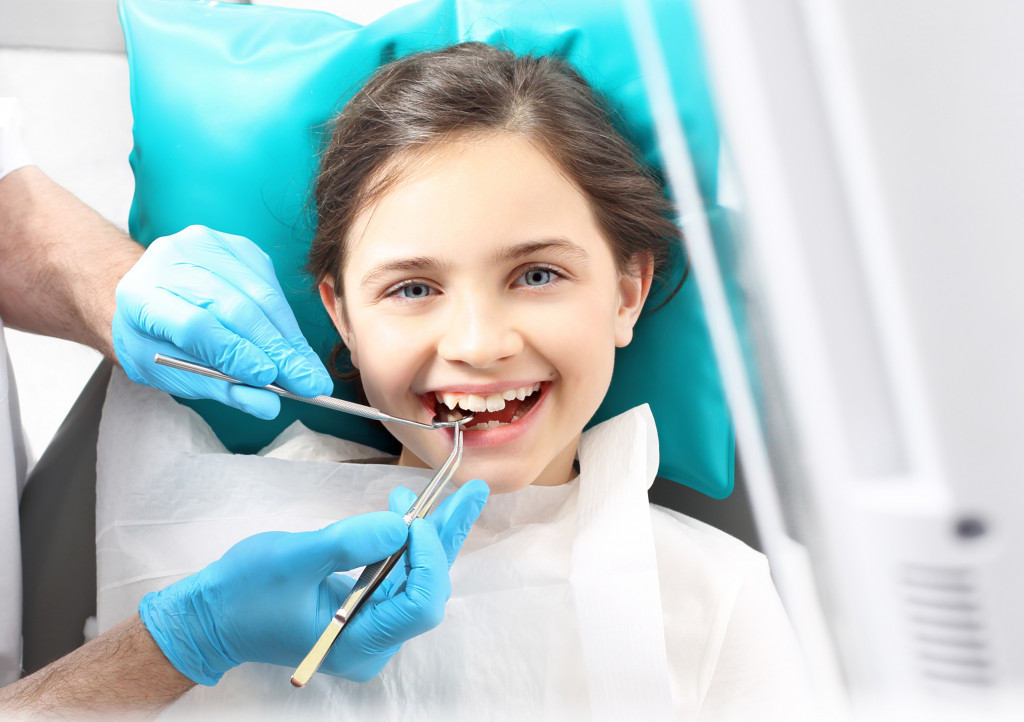- Tooth decay is children’s most common dental problem, caused by bacteria that break down sugars and starches.
- Gum disease is caused by poor oral hygiene, such as not brushing or flossing regularly.
- Tooth sensitivity occurs when the tooth enamel wears down and can cause discomfort from hot, cold, sweet, or acidic foods.
- Malocclusion is a misalignment of teeth caused by genetics, thumb-sucking, tongue-thrusting, or mouth-breathing.
- Teaching your children good oral hygiene habits is essential for maintaining their dental health.
As a parent, you all want the best for your children, including their oral health. But sometimes, your child can still experience dental problems despite your best efforts. If left untreated, these problems can cause discomfort, pain, and potential long-term damage.
According to the American Dental Association (ADA), about 20 percent of children suffer tooth decay by age 5. Common dental problems include cavities, gum disease, thumb-sucking, and malocclusion (misalignment of teeth). Here are some common oral health problems in children and what you can do to prevent and treat them.
Tooth Decay
Tooth decay is the most common dental problem in children. It occurs when bacteria in the mouth break down the sugars and starches in food, producing acids that attack the teeth. This can lead to cavities, which can cause pain, infection, and even tooth loss.
To prevent tooth decay, ensure your child brushes their teeth twice daily with fluoride toothpaste, flosses daily, and avoids sugary and starchy foods and drinks. Also, make sure they have regular dental check-ups so that any problems can be detected early.
Gum Disease
Gum disease is a bacterial infection that affects the gums and the tissues that support the teeth. It is caused by poor oral hygiene, such as not brushing and flossing regularly. Symptoms of gum disease in children may include swollen, red, or bleeding gums, mouth sores, bad breath, and loose teeth. To prevent gum disease, ensure your child brushes their teeth twice daily, flosses daily, and has regular dental check-ups. Early treatment is essential to prevent the condition from progressing.
Tooth Sensitivity

When the hard covering of the tooth (enamel) wears off, the layer beneath it becomes exposed, leading to tooth sensitivity. This can cause discomfort or pain when consuming hot or cold foods and drinks, acidic foods, or sweet foods.
To avoid tooth sensitivity, your child must brush their teeth gently using a toothbrush with soft bristles and fluoride toothpaste. Also, staying away from acidic and sugary foods and drinks is recommended. If your child is already experiencing tooth sensitivity, you can use desensitizing toothpaste or consult a dentist for further treatment.
Malocclusion
Malocclusion is a dental problem that affects the way the teeth fit together. It can cause problems with speech, chewing, and overall dental health. Causes of malocclusion in children include genetics, thumb-sucking, tongue-thrusting, and mouth-breathing.
Treatment for malocclusion may include braces, retainers, or other orthodontic appliances. If you suspect your child has malocclusion, make an appointment with an orthodontist as soon as possible.
Keeping Your Child’s Teeth Healthy
Oral health is critical, affecting your child’s overall health and well-being. It’s easy to let dental hygiene become an afterthought, but there are some basic things you can do to keep your child’s teeth healthy. Here are a few tips:
Start early with good dental habits
The best way to keep your child’s teeth healthy is to develop good dental habits early. Even before your child’s teeth come in, you can clean their gums with a damp cloth or gauze pad after feeding. Once the first teeth appear, brush them with a soft-bristled brush and water.
Keep up with regular dental checkups
Regular dental checkups are essential to maintaining your child’s dental health. The first dental office visit should occur when your child’s first tooth erupts or by their first birthday, whichever comes first. After that, your child should have regular checkups every six months or as their dentist recommends. These appointments allow the dentist to monitor your child’s oral health and address any concerns or issues promptly.
Promote a healthy diet

The easiest way to avoid tooth decay is to promote a healthy diet. Limit sugary drinks and snacks, and instead, give your child plenty of fresh fruits and vegetables. They should brush their teeth afterward to remove the sugar when eating sweets. Encourage your child to drink plenty of water, especially if they are drinking sugary drinks.
Lead by Example
Children often follow what they see. Set a good example for your child by making dental hygiene essential to your routine. Brush and floss your teeth daily and avoid sugary foods and drinks as much as possible. Seeing you prioritize your oral health will encourage your child to do the same.
Final Thoughts
Preventive oral healthcare and regular dental check-ups are key to maintaining good oral health in children. While some dental problems cannot be completely avoided, early detection and treatment can prevent more significant problems from developing. By teaching your child good oral hygiene habits and ensuring they have regular dental check-ups, you can help them achieve a healthy, beautiful smile they can be proud of.
